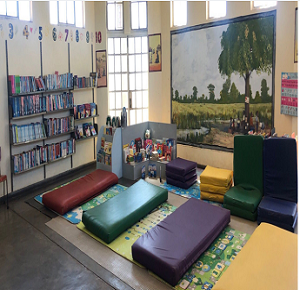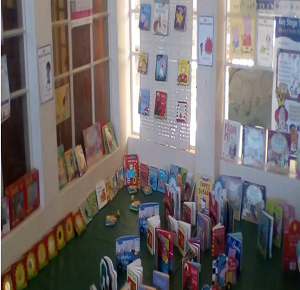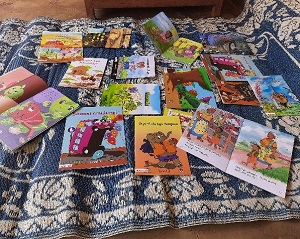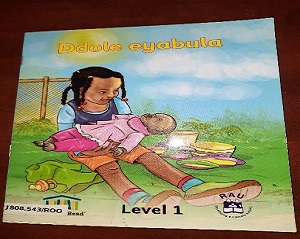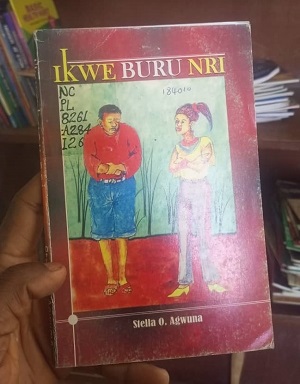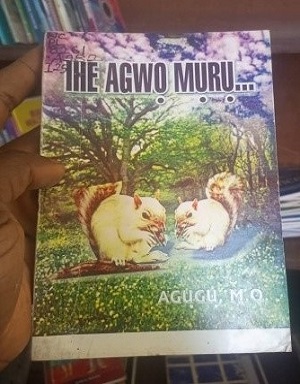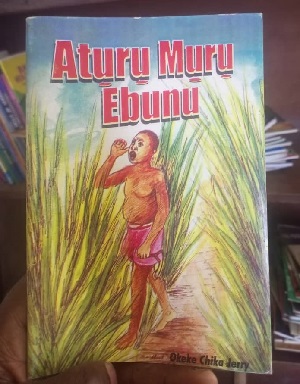The Early Literacy Development Course – outcome and experiences from cohort 1
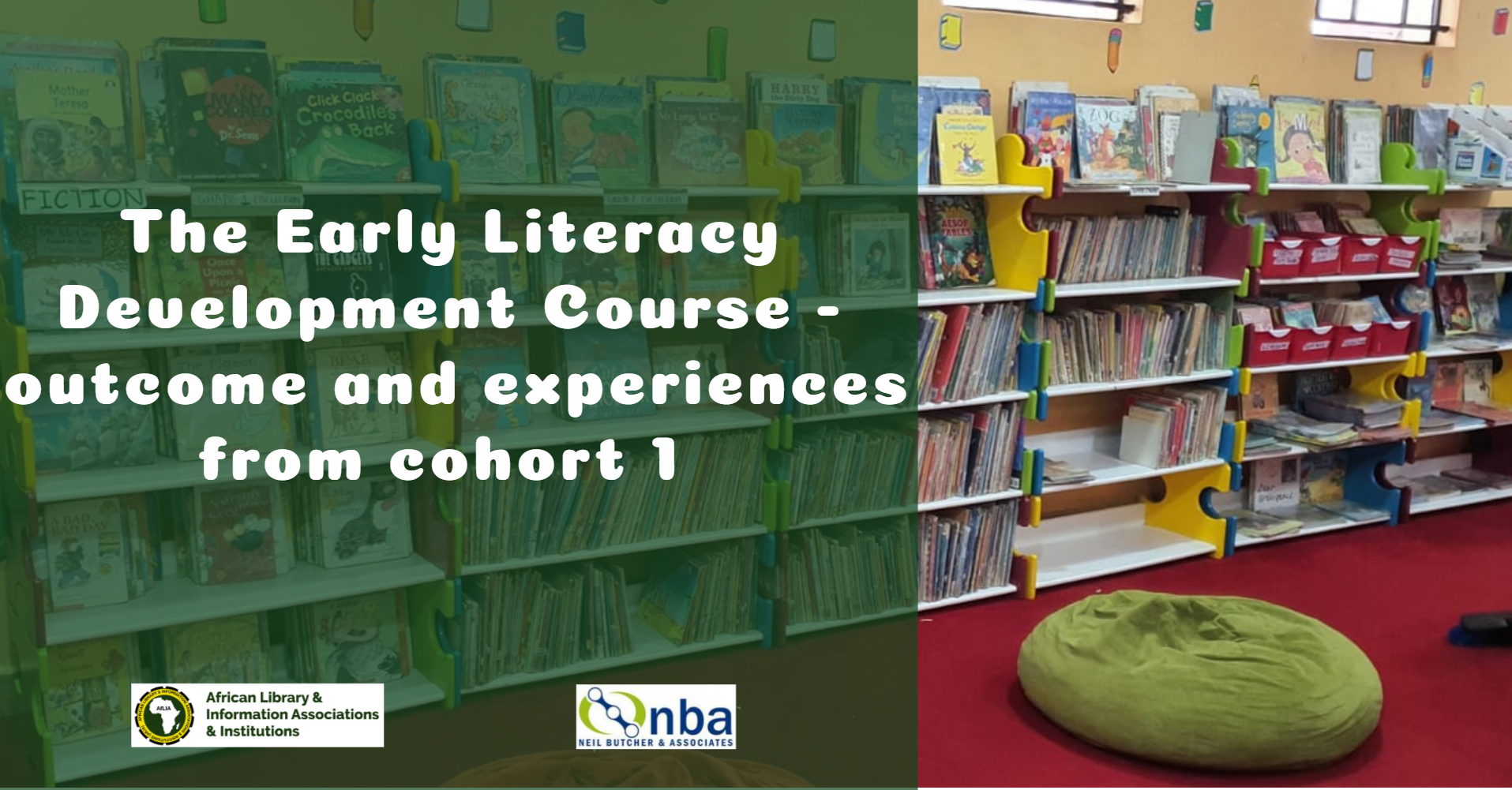
10 APRIL 2023
“Early literacy development is a foundational building block for academic achievement, lifelong learning and sustainable development. More so, when children are exposed to literacy-rich environments with age-appropriate resources in their mother tongue, they internalize learning as part of their everyday lives.”
AfLIA Early Literacy Development Course, 2022.
The Virtual Graduation
Three African librarians excelled in the recently concluded Early Literacy Development course Cohort 1.
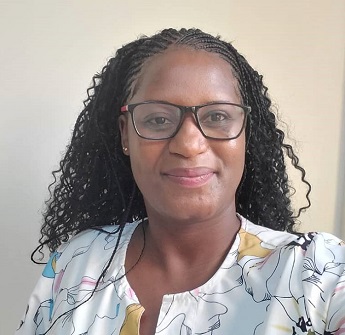
Debrah Mulenga Mwango, Zambia 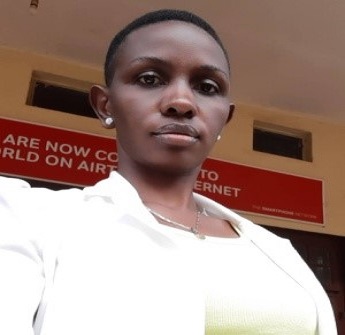
Daisy Ashabehebwa, Uganda 
Naomi Oghale Awah, Nigeria
The Cohort Valedictorian was Debrah Mulenga Mwango of National Science Centre Zambia. In her speech during the virtual graduation, she noted that despite the challenges of balancing work, home and taking the online course, she learned;
- “the importance of driving early literacy development across communities in Africa
- Early literacy development is a lot more than reading and writing. It is about identifying and using innovation to prompt creativity in children.
- the critical role mother tongue languages play in early literacy learning and also how to conduct resource selection in my library that will improve the mother tongue language resources available.
- The new ideas and activities that would help to children to develop pre-reading skills as well as how to prepare them to learn to read and to become confident readers and writers and
- the benefits of Open licensing and the different Creative Commons licenses, how they help in adapting and translating stories, and the practical aspects of translating an early literacy resource using story weaver and African story book.”
Naomi Oghale Awah, Delta State Library Board, Nigeria and Daisy Ashabehebwa, National Library of Uganda were very close runners-up to the Cohort Valedictorian.
The background
With funds from our partners (Neil Butcher & Associates), AfLIA had created a course on Early Literacy development for African librarians. The course was piloted from April 7th to 17th May 2022. The report can be accessed here.
We had recognized the technical difficulties that participants face when we piloted the course. Adjustments were made. Thus;
- Participants in this cohort were sent the pdf of the course resources as well as the assignment templates. This was to help them access the information for each module as well as do the required assignments. That notwithstanding, all participants were required to participate in the discussion forums for each module which had conversation starters tailored specifically towards teasing out and sharing information among the participants as well as encouraging critical and creative thinking.
- The content was made more agile and inclusive in full consideration of the fact that participants are in fulltime employment, some have families and internet is not always available.
Cohort 1
This Cohort took off by 10h00 GMT on Monday 28th, November 2022. Fifty one (51) participants from eleven (11) African countries namely; Egypt, Eswatini, Ghana, Kenya, Malawi, Nigeria, Sierra Leone, South Africa, Uganda, Zambia and Zimbabwe had indicated interest in the course and they were all admitted. Twenty (20), out of this number never registered or showed up for the live sessions neither did they engage with the resources, assignments or forums. Thus, the course effectively had thirty one(31) participants
The Course
The course consists of four (4) modules. Participants were graded for doing the assignment for each module and participating in the discussion forums on the Moodle Learning platform.
Module 1
Participants were asked to think and come up with an early literacy focused library activity or programme for implementation. The following guidelines were given;
- “Provide a description of the activity or programme.
- Define a goal for this activity or programme. What would you like to achieve?
- Who is your target audience? (Which community are you serving? How old are the children?
- What languages do they speak?)
- What resources are required (if any) to launch your activity? (people, stationary, books marketing, translation services, internet, etc.)
- Which institutions would you like to partner with for this activity or programme?
- What are your indicators of success? List at least three things that if achieved will allow your activity or programme to be considered a success.’’
Chilungamo Galimoto (Malawi National Library Service) submitted that; ‘the goal…is to introduce children to the world of books, love of reading with fun and to promote the library as a safe and welcoming space for children.” According to him, ‘the target audience for this programme is primary school pupils aged between 5 and 10 years old in the Lilingwe. The reading will be in smaller groups and in the library (Library City Centre). The location of the library is easily accessible for children. The languages they speak are Chichewa and English”. The assignment was done by 30 participants.
The Forum for Module 1 asked that everyone contribute by providing insights on what already exists in their libraries in terms of services, space, how to make the library attractive to children and we got interesting answers!
“We conduct story telling sessions. We hire elderly people every Saturday and this program is mostly loved by the kids” — Peter James Changwera, Malawi National Library Service –Headquarters.
This contribution had elicited many responses from the participants as they wanted to know the criteria and process for hiring the elderly people, and if they were paid for coming into the library to tell stories to children. It’s an idea that course participants will certainly adopt and adapt for use in their different libraries as they pointed out that children need to know their community history beyond those that are in the official history books as well as values that are invariably passed on through storytelling by elders.
What the libraries have been used to as pertains to storytelling to children in libraries was reported by a Zimbabwean librarian:
“On few occasions we have had authors who talk about their books, indigenous knowledge systems, traditional other traditional activities. Otherwise children’s librarians tell or retell stories taking turns with children” — Antonetta Sipho Madziva, Zimbabwe.
From Kenya, Caroline Makokha shared interesting activities that take place in her library
“We have Press Cutting Day where children bring special pictures cut from newspapers, magazines, then they mount in a special board with each explaining the content of the picture or rather what is on the entire picture…story hour where we project stories onto a wall asking children to write their own stories.” — Caroline Makokha.
Debrah Mulenga Mwango (Zambia) brought in an entirely new perspective into the discussions. She wrote;
“A smile should always be my trademark, welcoming children into my library requires me to be friendly, courteous, down to earth by embracing and treating all the children without any preference as a result of educational background, financial status or ethnicity etc. most children in the nearby community near the library are unable to read and write and are fluent in the local language spoken”. — Debrah Mulenga Mwango, Zambia.
The reality of many African homes where parents/caregivers do not have disposable income to pay library fines or replace lost books was brought to the fore by Myson Kayira (Malawi National Library Service). She wrote;
“We have challenges when it comes to borrowing because most parents discourage their children from borrowing fearing that they may not be able to keep the books safe”. — Myson Kayira, Malawi National Library Service.
The Forum for Module 1 also offered insights into spaces for children in African public and community libraries. Overall, 28 out of 31 participants contributed to the Module 1 Forum.
Antonetta Sipho Madziva from Zimbabwe said “In our libraries we created attractive vibrant corners that attract children to read”. She submitted these two pictures as examples of library spaces for children in Zimbabwe.
According to Caroline Wanjiku Mwai (KNLS), – “one of the things that attract children in our Library, is the large collection of story books, well arranged in such a way children can easily access them. She shared a picture of the shelves in her library.
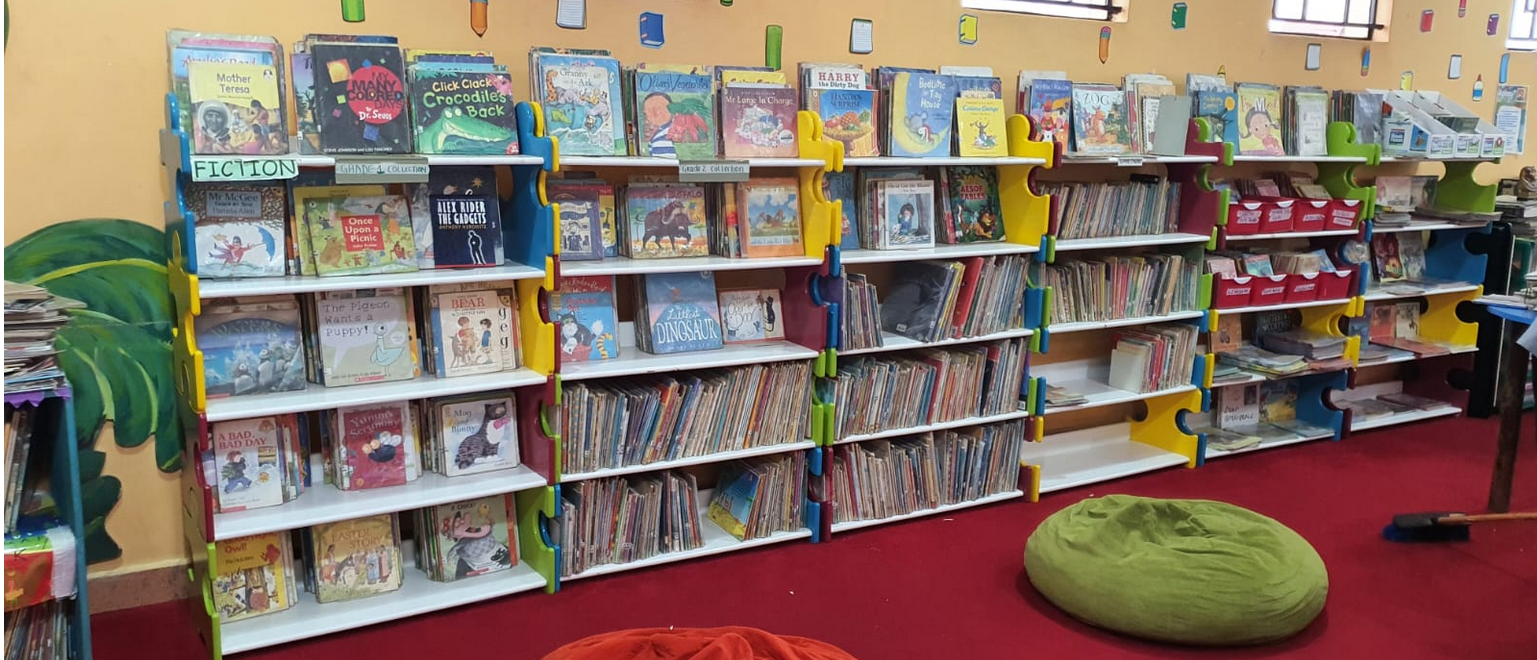
Peter James Chamgwera shared the picture of the Children’s corner Malawi National Library Services. It is aptly named ‘Children’s Home’!
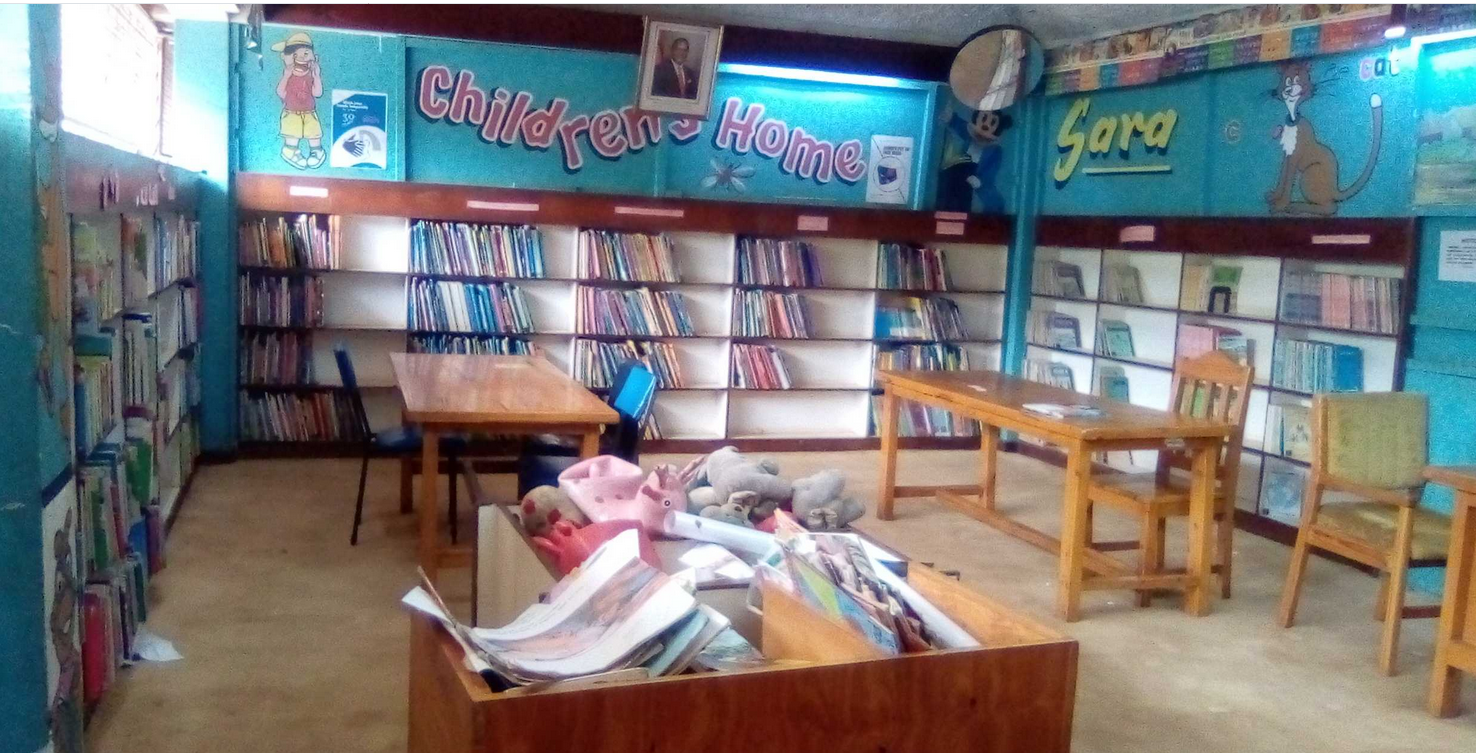
Pemphero Kalolokesya (Malawi National Library Service, Monkey Bay branch) also shared the picture of their Children corner.

These are all beautiful. However, according to Margaret Mbithuka; “My library is very small no space at all even to create a children corner, most of our activities we hold them outside the shade and the kids enjoy”. Thus, young adults and children study together as seen in the picture below:
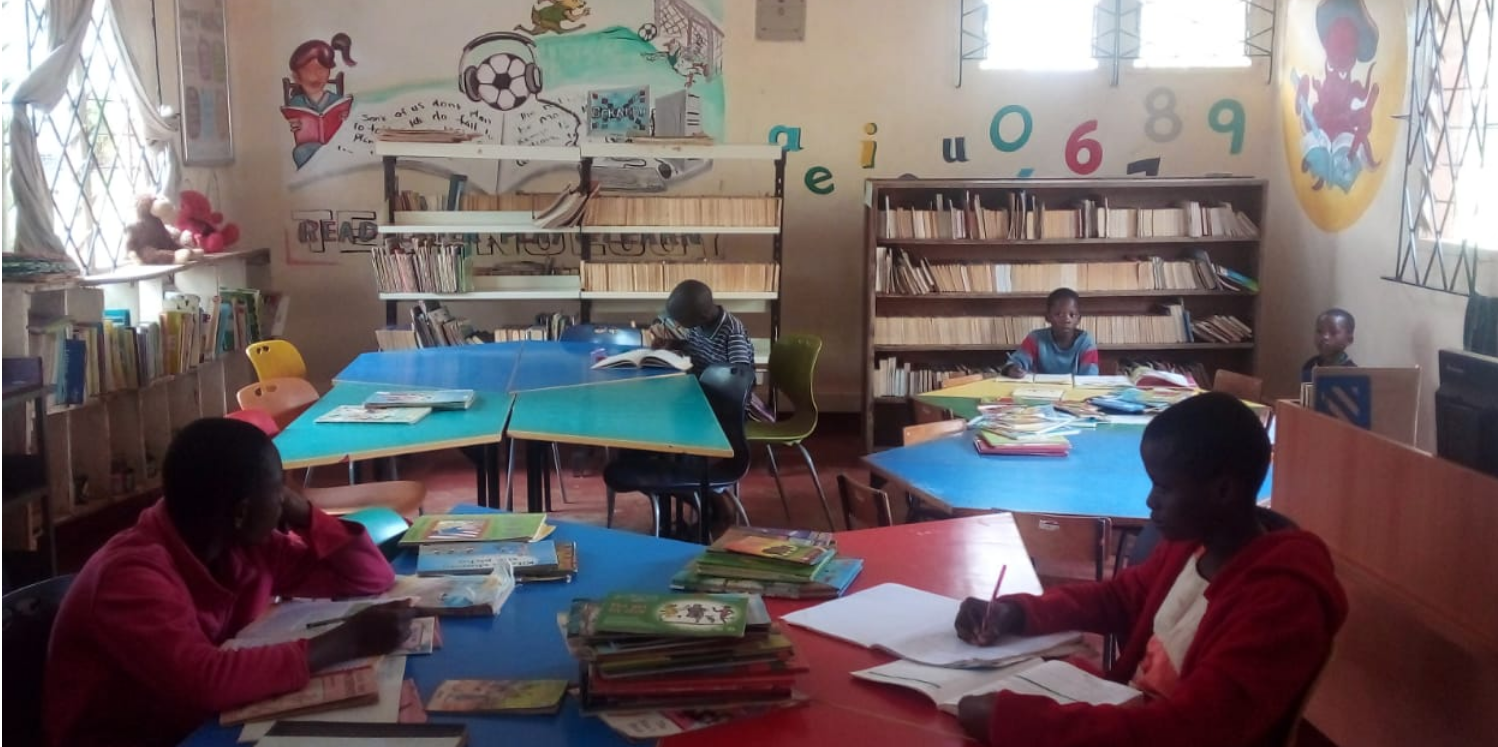
Module 2
This Module focused on how to make the library environment friendly for early childhood literacy development and to find out what children love about the library. Participants were made to understand where and how ‘play’ fits into early learning and to gain more insights about what we mean by ‘play’. They were also taught the importance of the use of mother tongue / local languages to drive literacy development and to help children learn to understand and speak English.
The Module 2 assignment asked participants to complete a research exercise looking at the early literacy mother-tongue resources available in their libraries, or within the broader community and answer questions about the acquisition, availability and use of mother tongue story books. Twenty seven (27) participants did the assignment and some shared pictures of the mother tongue resources they have in their libraries.
Discussions in the Forum for Module 2 provided some nuggets. Twenty one (21) participants posted in the Forum. Look at this by Debra Mulenga Mwango as the participants were making contributions on how to make the library environment more friendly and welcoming to children;
“You can imagine how intimidating the traditional library environment used to be ‘strictly no making noise’, which child would think of leaving home to go visit the library?…definitely no one at all… I think even before a child gets to the library the library security personnel would gladly chase them away for fear of disturbing adult clients”. — Debra Mulenga Mwango.
“I started a activity it’s name is being a doctor: children were encouraged to play by allocating a space in which activities are conducted, drawing the human body, creating a puzzle for it, cutting it and sticking it, and creating maquettes to encourage children to identify the parts of the human body.” — Asmaa Said Abdel Samee, October 6th Library, Egypt
“We make a puzzle of many letters on a sheet of paper. The children then sit in groups of five and search and write a list of words they can see from the puzzle. When they have exhausted all words, we then go through the puzzle with them altogether” — Hilda Wambui Mwangi, Kenya National Library Services, Kangema
“We encourage learning through play during the afternoon hours because that is when children are a little bit tired of reading hence they less concentrate. We spread mats and give toys to the young children we also give molding clay whereby children can create short words or built small things using the clay, for the elder children we give them puzzle to fill missing letters. We also give children rubiks cube which broaden their mind with problem solving skills” — Leah Njeri Mugo (Kenya National Library Services, Nakuru Branch
Lastly, Chanda Mungulube (Zambia) reminded us of this important fact;
“A library should be an interesting place and children do not concentrate for too long. Hence, the idea of games and dolls is a very good idea. Libraries must be fun especially for the children” — Chanda Mungulube, Zambia
Module 3
The module was an introduction to emergent literacy, reading techniques and teaching children how to read. The Forum discussion focused on helping the participants observe and report the state of emergent literacy in their immediate communities – are children aged between 2-10yrs going to school? At what age do they start school? Do libraries help the out of school children? Do their libraries work with schools to assist these children learn how to read?
This contribution by Hilda Wambui Mwangi (Kenya National Library Services, Kangema), says everything that needs to be known about the state of emergent literacy in many communities in Africa;
“Some children that are old enough to go to school, some go to school, others visit the library while others due to lack of school fees , they remain at home and assist in home chores like looking after their younger siblings, taking care and taking cattle to graze, fetching firewood.
We can disseminate information materials by taking them to the community’s homesteads and encourage them to read and write.” — Hilda Wambui Mwangi, Kangema Community Library, Kenya
23 participants contributed to the Forum while 27 did their assignment for the Module which had asked that they invite an early literacy teacher in their different communities to have a conversation to find out what they think about the role of librarians and library staff when it comes to early literacy. Alternatively, they could speak to a parent or caregiver of one of the young children in your community who is learning to read and write for the first time. Participants reported through their assignments that the persons they interviewed were of the view that there needs to be more synergy and collaborations between teachers and librarians as children need both professionals in order to learn how to read and fall in love with books.
Module 4
The Module has the following objectives:
- Familiarize yourself with open licensing and why it’s important.
- Learn about the different Creative Commons licenses that are available and how they can be used.
- Find out more about Open Educational Resources, how and where you can access them, and how they can be used.
- Understand how you can adapt open content to suit your purposes.
- Think about what makes a good story!
- Consider the benefits of adapting and translating stories.
- Find out more about translation and versioning.
- Translate an early literacy resource.
Conversations prompts that were provided in the Forum for Module 4 led participants to discuss mother tongue language and resources, translation of stories, creation of original stories and publishing platforms. Some intriguing points came up!
According to Myson Kayira; “In Malawi in junior primary School (STD 1-4) all subjects except English are taught in Chichewa which happens to be one of the mother tongues. This has helped to increase enrollment at school because of the understandings that is achieved through reading local languages.”
However, other countries are finding it difficult! Caroline Wanjiku Mwai is from Kenya and she thinks she has challenges due to the multilingualism in her country –
“On the onset of education, children would learn their mother tongue, but the current situation in our country Kenya with the over 47 languages, Kiswahili n English are the national language. I still wonder how we would implement mother tongue in a school that has diverse mother tongue say over 10 or so.” — Caroline Wanjiku Mwai, Kenya
For Debrah Mulenga Mwango, there’s a challenge of funding but the pathways created through open licensing can help librarians to be more innovative. She said;
“In our country (Zambia), libraries still face challenges of inadequate funding for the purchase of books and in most cases priority during book procurement is given to textbooks and not fiction books. Therefore, as a librarian being able to translate stories that we can find online and publish them, being able to retell them in a language that our children understand best is not only addressing the problem of inadequate funds but also making us become creative and more responsive to the needs of our user.” ” — Debrah Mwango, Zambia
Naomi Oghale Awah (Delta State Library Board, Nigeria) also feels that there is a pathway for creating and using mother-tongue resources in her library;
“I have come to realize that my library community has a lot of impactful role to play in story creation and re-telling but the truth be told, in my library community all these are not available, where i work we don’t have this culture of storytelling … Most of these publishing platforms – African storybook, Storyweaver, bloom library etc. are new to us, but with the awareness from this training, we are now knowledgeable about them and will start using them to create stories.” — Naomi Oghale Awah (Delta State Library Board, Nigeria
The final assignment required the participants to translate storybooks for children found on open platforms. Guidelines and tutorials were provided on how to work on the platforms. It was challenging but they dared to try and they actually did it! The stories are now part of AfLIA’s Digital Library of stories in mother tongue for children and can be accessed here – https://storyweaver.org.in/search?query=aflia
Here are the links and some of the front covers of the books translated into different mother tongues.
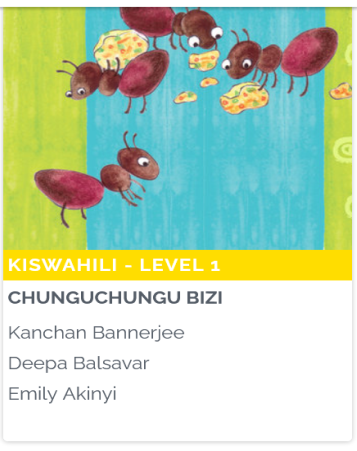
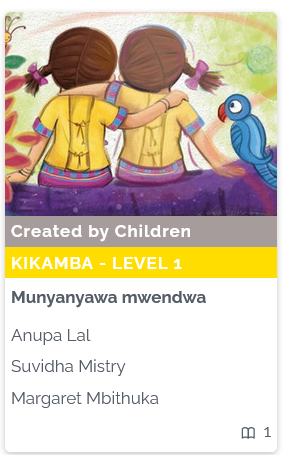
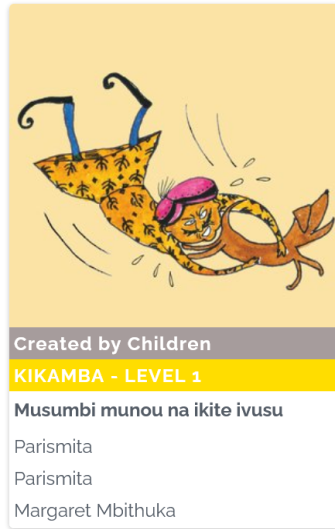
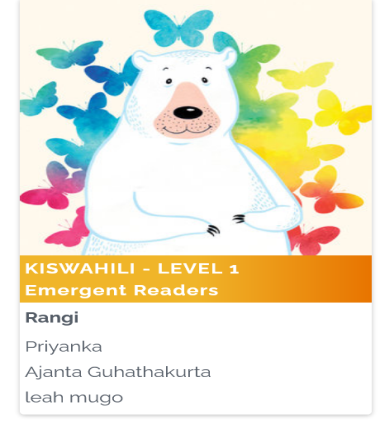
You can read the entire story here: https://storyweaver.org.in/stories/556629-colours
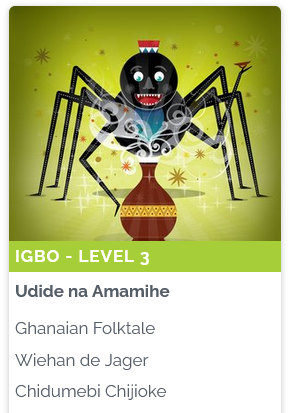
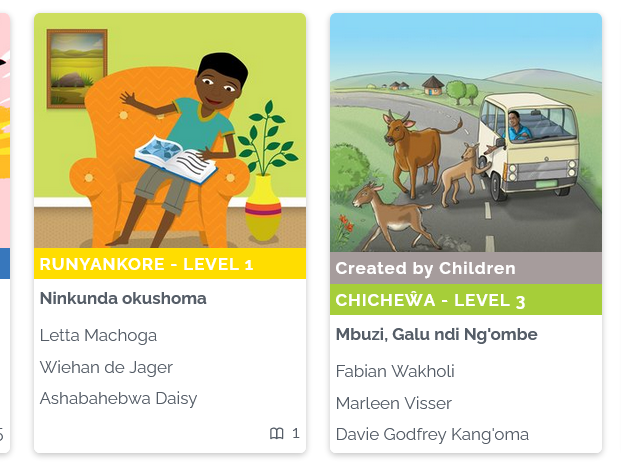
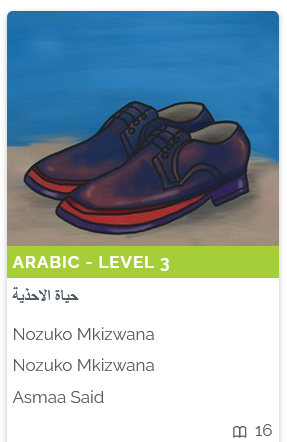
The first story is about the life of shoes and the second story is about a girl who suddenly stopped smiling.
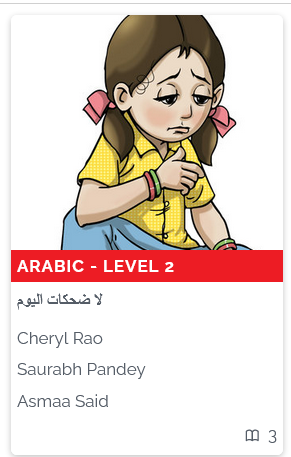
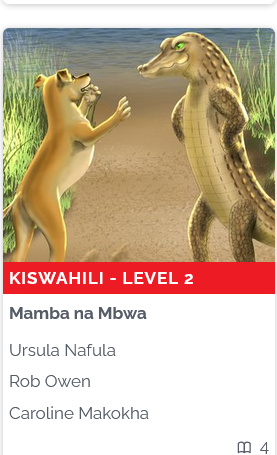
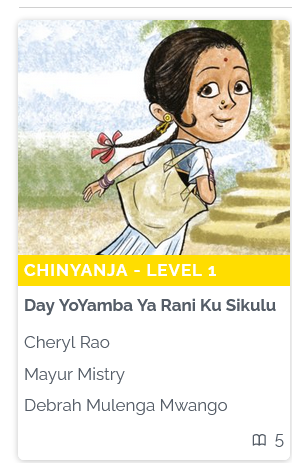
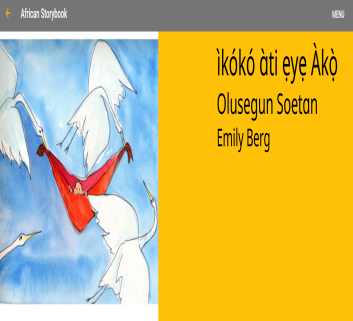
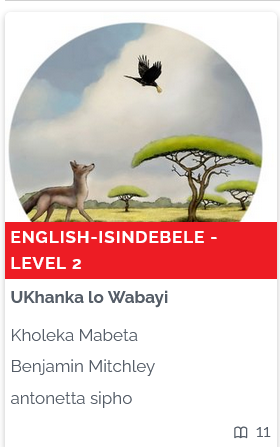
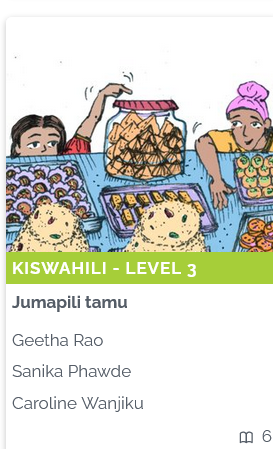
https://storyweaver.org.in/stories/551927-sunday-sweet
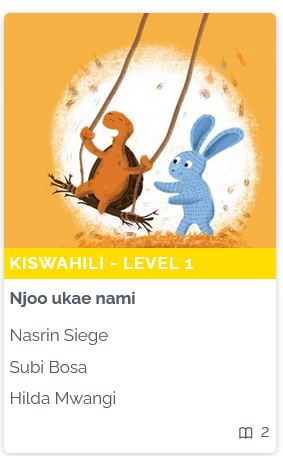
https://storyweaver.org.in/stories/552971-come-stay-with-me
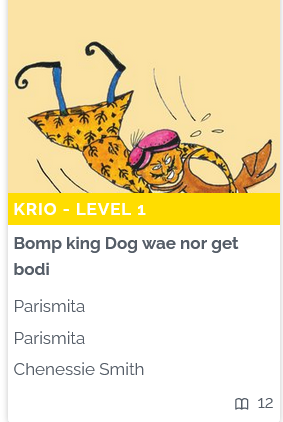
https://storyweaver.org.in/stories/553045-fat-king-thin-dog
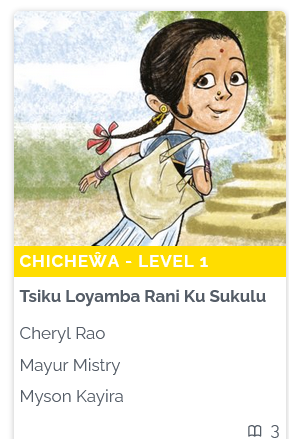
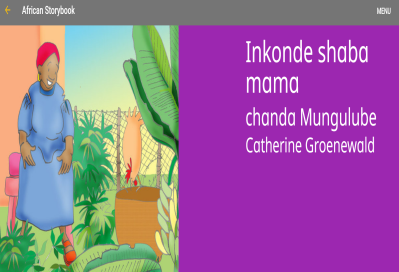
https://www.africanstorybook.org/reader.php?id=40762&a=0&d=0
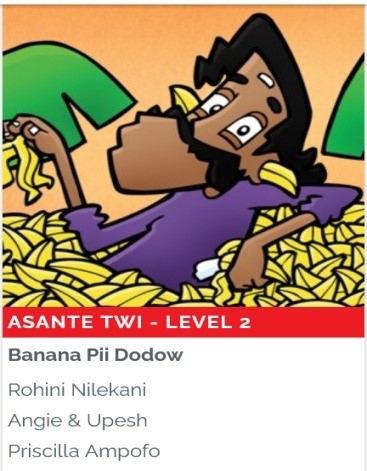
The course ended with a virtual graduation on Friday, 24th February, 2023. Twenty four (24) participants completed the course. Seventeen (17) of these participants had certificates of Excellence as they scored 80% and above, while seven (7) others each had a certificate of participation. The next Cohort for the course will run from Monday, 2nd October to Friday, 17th November, 2023.

